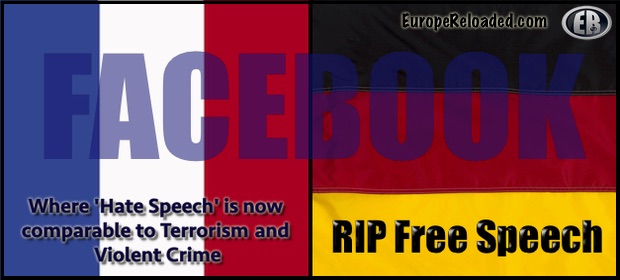
ER Editor: The phrase below, ‘countries without an independent judiciary could abuse it’, is precisely the point. The French judiciary has shown itself to be hopelessly biased and a tool of the government in the case of the Gilets Jaunes where ordinary citizens who’ve never been on a march before are getting fast-tracked through the court system and having heavy penalties slapped on them for exercising their public right to protest.
********
Killing Free Speech in France, Germany and on the Internet
- In early July, France’s National Assembly adopted a draft bill designed to curtail online hate speech. The draft bill gives social media platforms 24 hours to remove “hateful content” or risk fines of up to 4% percent of their global revenue. The bill has gone to the French Senate and could become law after parliament’s summer recess. If it does, France will be the second country in Europe after Germany to pass a law that directly makes a social media company censor its users on behalf of the state.
- Knowing that a mere Facebook post could end you up in front of a judge in court is very likely to put a decisive damper on anyone’s desire to speak freely.
- If Facebook’s agreement with France is replicated by other European countries, whatever is left of free speech in Europe, especially on the internet, is likely to dry up fast.
- While Facebook eagerly claims to be fighting hate speech online, including claiming to have removed millions of pieces of terrorist content from its platform, according to a recent report from the Daily Beast, 105 posts of some of Al Qaeda’s most notorious terrorists are still up on Facebook, as well as YouTube.
- When will Facebook — and YouTube — make it a priority to remove material featuring the terrorist Anwar al-Awlaki, whose incitement has inspired actual terrorists to kill people?

In May, France called for increasing government oversight over Facebook. Now Facebook has agreed to hand over to French judges the identification data of French users suspected of hate speech on its platform, according to France’s Secretary of State for the Digital Sector, Cédric O.
Previously, according to a Reuters report, “Facebook had refrained from handing over identification data of people suspected of hate speech because it was not compelled to do so under U.S.-French legal conventions and because it was worried countries without an independent judiciary could abuse it”. Until now, Reuters noted, Facebook had only cooperated with the French judiciary on matters related to terrorist attacks and violent acts by transferring the IP addresses and other identification data of suspected individuals to French judges who formally demanded it.
Now, however, “hate speech” — as speech that fails to comply with current political orthodoxy is conveniently labelled — appears to have become comparable to terrorism and violent crime. How autocratic, yet Cédric O apparently loves it: “This is huge news, it means that the judicial process will be able to run normally”.
It is highly probable that other countries will want to have a similar agreement with Facebook; it also appears likely that Facebook will comply. In May, for instance, as France was debating legislation that would give a new “independent regulator” the power to fine tech companies up to 4% of their global revenue if they do not do enough to remove “hateful content” from their network, Facebook’s CEO Mark Zuckerberg commented: “I am hopeful that it [the French proposal] can become a model that can be used across the EU”.
France is the first and so far only country to have entered into such an agreement with Facebook.
The new agreement could signal the de-facto end of free speech on Facebook for French citizens. Self-censorship in Europe is already widespread: a recent survey in Germany showed that two thirds of Germans are “very careful” about what topics they discuss in public — Islam and migrants being the most taboo. Knowing that a mere Facebook post could end you up in front of a judge in court is very likely to put a decisive damper on anyone’s desire to speak freely.
French authorities are already in the process of setting an extremely public example of what can happen to those who use their freedom of speech on the internet. Marine Le Pen, leader of the National Rally Party, was recently ordered to stand trial and could face a maximum sentence of three years in prison and a fine of 75,000 euros ($85,000) for circulating “violent messages that incite terrorism or pornography or seriously harm human dignity”. In 2015, she had tweeted images of atrocities committed by ISIS in Syria and Iraq to show what ISIS was doing.
If Facebook’s agreement with France is replicated by other European countries, whatever is left of free speech in Europe, especially on the internet, is likely to dry up fast.
In early July, France’s National Assembly adopted a draft bill designed to curtail online hate speech. The draft bill gives social media platforms 24 hours to remove “hateful content” or risk fines of up to 4% percent of their global revenue. The bill has gone to the French Senate and could become law after parliament’s summer recess. If it does, France will be the second country in Europe after Germany to pass a law that directly makes a social media company censor its users on behalf of the state.
Also in early July, in Germany — where the censorship law, known as NetzDG, also requires Facebook to remove content within 24 hours or face fines of up to 50 million euros — the Federal Office of Justice imposed a €2 million regulatory fine on Facebook “for the incomplete information provided in its published report [the publication of its transparency report for the first half of 2018 required under NetzDG] on the number of complaints received about unlawful content. This provides the general public with a distorted image both of the amount of unlawful content and of the social network’s response”.
According to Germany’s Federal Office of Justice, Facebook does not inform its users sufficiently of the option to report “criminal content” in the specific “NetzDG reporting form”:
“Facebook has two reporting systems in place: its standard feedback and reporting channels on the one hand, and the ‘NetzDG reporting form’ on the other. Users who wish to submit a complaint about criminal content under the Network Enforcement Act find themselves steered towards the standard channels, since the parallel existence of standard channels and the ‘NetzDG reporting form’ is not made sufficiently transparent, and the ‘NetzDG reporting form’ is too hidden…Where social networks offer more than one reporting channel, this must be made clear and transparent to users, and the complaints received via these channels are to be included in the transparency report. After all, procedures to handle complaints of unlawful content have a considerable impact on transparency.”
In response, Facebook said:
“We want to remove hate speech as quickly and effectively as possible and work to do so. We are confident our published NetzDG reports are in accordance with the law, but as many critics have pointed out, the law lacks clarity.”
While Facebook claims to be fighting hate speech online, including claiming to have removed millions of pieces of terrorist content from its platform, according to a recent report from the Daily Beast, 105 posts of some of Al Qaeda’s most notorious terrorists are still up on Facebook, as well as YouTube.
CONTINUE READING HERE
Judith Bergman, a columnist, lawyer and political analyst, is a Distinguished Senior Fellow at Gatestone Institute.

••••
The Liberty Beacon Project is now expanding at a near exponential rate, and for this we are grateful and excited! But we must also be practical. For 7 years we have not asked for any donations, and have built this project with our own funds as we grew. We are now experiencing ever increasing growing pains due to the large number of websites and projects we represent. So we have just installed donation buttons on our websites and ask that you consider this when you visit them. Nothing is too small. We thank you for all your support and your considerations … (TLB)
••••
Comment Policy: As a privately owned web site, we reserve the right to remove comments that contain spam, advertising, vulgarity, threats of violence, racism, or personal/abusive attacks on other users. This also applies to trolling, the use of more than one alias, or just intentional mischief. Enforcement of this policy is at the discretion of this websites administrators. Repeat offenders may be blocked or permanently banned without prior warning.
••••
Disclaimer: TLB websites contain copyrighted material the use of which has not always been specifically authorized by the copyright owner. We are making such material available to our readers under the provisions of “fair use” in an effort to advance a better understanding of political, health, economic and social issues. The material on this site is distributed without profit to those who have expressed a prior interest in receiving it for research and educational purposes. If you wish to use copyrighted material for purposes other than “fair use” you must request permission from the copyright owner.
••••
Disclaimer: The information and opinions shared are for informational purposes only including, but not limited to, text, graphics, images and other material are not intended as medical advice or instruction. Nothing mentioned is intended to be a substitute for professional medical advice, diagnosis or treatment.




